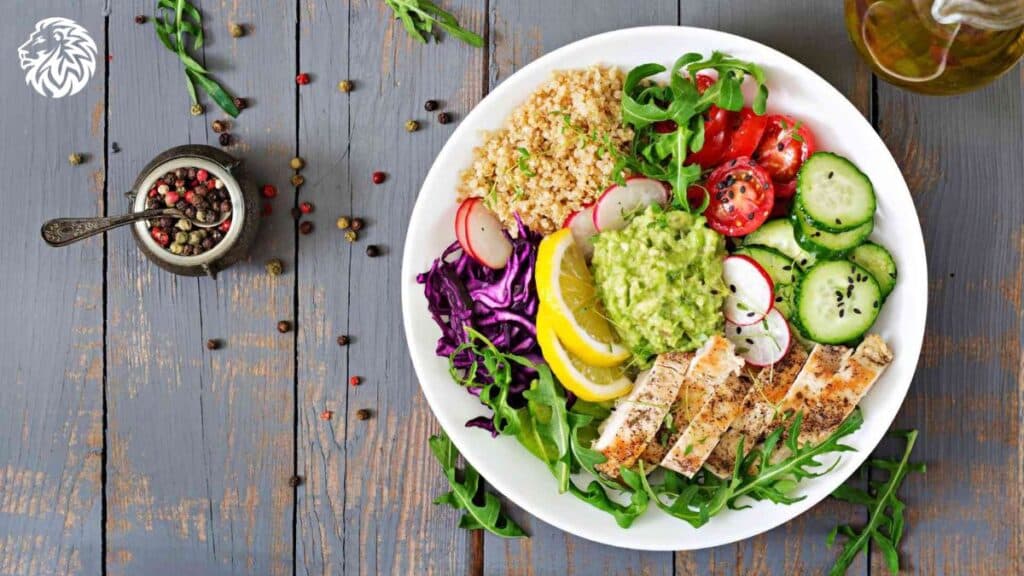The Mediterranean diet is more than just a meal plan; it’s a centuries-old tradition steeped in the rich culinary cultures of countries bordering the Mediterranean Sea. Renowned for its diverse and flavorful palette, this diet emphasizes the consumption of fresh fruits, vegetables, whole grains, nuts, and, notably, olive oil, a staple in Mediterranean cooking. Fish and poultry feature regularly in meals, while red meats and sweets are enjoyed sparingly. A hallmark of this diet is its flexibility and emphasis on seasonal, locally-sourced produce, reflecting the agricultural patterns of the Mediterranean region.
Originating from the dietary patterns of countries like Greece, Italy, and Spain, the Mediterranean diet has evolved over millennia. This diet is a mash-up of flavors and techniques, shaped by the geography and climate of the Mediterranean basin and influenced by various cultures and civilizations that flourished there. Beyond its culinary aspects, the diet is deeply intertwined with the lifestyle of the Mediterranean people, embodying a philosophy that celebrates community, leisurely dining, and a harmonious relationship with nature. Its worldwide recognition and adoption are not only a testament to its appealing flavors but also its numerous health benefits, a subject that has been extensively researched and lauded in the nutrition community.
Key Components of the Mediterranean Diet

At the heart of the Mediterranean diet are core food groups that collectively define its nutritional profile and distinct flavors.
- Primary Foods: Fruits, Vegetables, Whole Grains, Nuts, and Olive Oil
- Fruits and Vegetables: Central to every meal, these offer a rich array of vitamins, minerals, and fibers. Typical choices include leafy greens, tomatoes, cucumbers, and a variety of fruits.
- Whole Grains: Integral for their fiber and nutrients, options like whole wheat, barley, quinoa, and brown rice are common.
- Nuts and Seeds: These are important sources of healthy fats, protein, and fiber. Almonds, walnuts, and sesame seeds are popular choices.
- Olive Oil: The primary source of added fat, olive oil is used generously for cooking and dressings, celebrated for its heart-healthy properties.
- Moderate Consumption of Fish, Poultry, and Dairy
- Fish and Seafood: Consumed often, fish like salmon, sardines, and mackerel, rich in omega-3 fatty acids, are preferred.
- Poultry: Chicken and turkey are more common than red meats, usually grilled or baked.
- Dairy: Consumed in moderation, with a preference for fermented dairy like Greek yogurt and cheese.
- Limited Consumption of Red Meats and Sweets
- Red meats are eaten infrequently, viewed more as a special occasion food.
- Sweets are enjoyed sparingly, with a focus on natural sweets like fruits or honey.
- Hydration and Moderate Wine Consumption
- Water: The main beverage of choice, with a strong emphasis on staying hydrated.
- Wine: Typically enjoyed in moderation, especially red wine, which is believed to have heart-healthy benefits. However, consumption is optional and always in moderation.
This balance of foods in the Mediterranean diet not only caters to a variety of nutritional needs but also encapsulates the essence of Mediterranean culinary traditions, blending health with pleasure.
Health Benefits

The Mediterranean diet has been the subject of extensive research, revealing a multitude of health benefits. This diet’s positive impact on various aspects of health contributes to its global recognition and recommendation by numerous health professionals.
- Heart Health
- Numerous studies have shown that the Mediterranean diet can significantly reduce the risk of heart disease. This is attributed to its emphasis on heart-healthy fats (found in olive oil, nuts, and fish), high fiber content, and limited intake of red meat.
- The diet is also known to improve cholesterol levels and blood pressure, further contributing to cardiovascular health.
- Weight Management
- The Mediterranean diet is effective for sustainable weight management. Its emphasis on whole foods and healthy fats leads to a feeling of fullness, which can prevent overeating.
- Unlike restrictive diets, it offers a varied and enjoyable eating pattern, making it easier to maintain long-term.
- Chronic Disease Prevention
- There’s evidence suggesting that the Mediterranean diet lowers the risk of type 2 diabetes by improving blood sugar levels and insulin sensitivity.
- The diet’s anti-inflammatory properties, largely due to the high intake of antioxidants from fruits, vegetables, and olive oil, may also reduce the risk of certain cancers.
- Longevity
- The diet is associated with increased life expectancy. This is likely due to its potential in preventing chronic diseases and maintaining heart and brain health.
- The diet’s nutrient-dense profile supports overall body health, which is crucial for aging populations.
- Mental Health
- Emerging research indicates a positive impact on mental health. The diet’s high intake of omega-3 fatty acids, vitamins, and minerals can benefit brain function and may reduce the risk of depression and cognitive decline.
- The social aspect of the diet, involving communal meals and a relaxed approach to eating, also plays a role in mental well-being.
Overall, the Mediterranean diet offers a holistic approach to health, emphasizing not only physical well-being but also mental and emotional health, reflecting the interconnectedness of diet, lifestyle, and overall health.
Dietary Guidelines and Meal Planning

The Mediterranean diet is characterized by its flexibility and variety, making it adaptable to various lifestyles and preferences. Here are some guidelines, sample meal plans, and practical tips for incorporating this diet into daily life.
- Daily and Weekly Dietary Recommendations
- Daily: Base meals around vegetables, fruits, whole grains, and healthy fats. Include a moderate amount of dairy and protein from fish or poultry.
- Weekly: Aim to have fish at least twice a week. Limit red meat to a few times a month and opt for lean cuts.
- Sample Meal Plans
- Breakfast: Greek yogurt with honey, nuts, and berries, or a whole-grain toast with avocado.
- Lunch: Quinoa salad with mixed vegetables and feta cheese, or a tuna salad with olive oil dressing.
- Dinner: Grilled salmon with a side of roasted vegetables and brown rice, or a chickpea and vegetable stew.
- Recipes
- Explore recipes that incorporate a variety of vegetables, whole grains, and lean proteins. Dishes like ratatouille, tabbouleh, and grilled fish with herbs are good examples.
- Desserts can include fruit-based dishes, such as baked apples with cinnamon or a small portion of dark chocolate.
- Tips for Shopping and Meal Preparation
- Shopping: Focus on buying fresh, seasonal produce. Visit local markets for the freshest options and choose whole-grain products.
- Preparation: Cook in batches to save time. Many Mediterranean dishes like stews and salads can be prepared in advance and enjoyed throughout the week.
- Storage: Store nuts, seeds, and whole grains in airtight containers to maintain their freshness.
Remember, the key to the Mediterranean diet is balance and enjoyment of food. It’s about making gradual changes to incorporate more of these healthy foods into your diet and enjoying meals with family and friends.
Cultural and Lifestyle Aspects

The Mediterranean diet extends beyond just food choices; it embodies a lifestyle that integrates physical activity, social connections, and a balanced approach to eating. This holistic view is what sets it apart from many other diets.
- Importance of Physical Activity
- Physical activity is an integral part of the Mediterranean lifestyle. This doesn’t necessarily mean structured exercise routines but includes daily activities like walking, gardening, swimming, or cycling.
- The emphasis is on staying active in enjoyable ways, which contributes to overall well-being and complements the diet’s health benefits.
- Social and Communal Aspects of Eating
- Meals are often viewed as a time to gather and connect with family and friends, rather than just a necessity. This communal aspect is fundamental in Mediterranean cultures.
- The act of sharing meals not only strengthens social bonds but also promotes mindful eating and enjoyment of food, which is essential for a healthy relationship with food.
- Comparison with Other Popular Diets
- Unlike many modern diets that focus on strict rules and often eliminate certain food groups, the Mediterranean diet is more about moderation and variety.
- Compared to low-carb or high-protein diets, it doesn’t categorize carbs or fats as ‘bad’. Instead, it encourages whole grains and healthy fats.
- In contrast to fad diets, which are often unsustainable in the long term, the Mediterranean diet is more of a lifestyle choice, promoting overall health without drastic restrictions.
In essence, the Mediterranean diet is less about stringent dietary limitations and more about embracing a way of life that values the pleasure of eating wholesome foods, staying active, and enjoying meals in the company of others. This approach not only nourishes the body but also the mind and spirit, contributing to a holistic sense of well-being.
Challenges and Considerations

Adopting the Mediterranean diet can come with its own set of challenges, and there are important considerations to keep in mind for different health needs and environmental impacts.
- Potential Challenges in Adopting the Diet
- Accessibility and Cost: Fresh produce, seafood, and olive oil, staples of this diet, can be more expensive or less accessible in certain regions.
- Cultural and Dietary Habits: Shifting from a diet high in processed foods or red meat to one rich in vegetables and whole grains can be a significant change for some individuals.
- Modifications for Different Health Needs and Preferences
- Allergies and Intolerances: For those with gluten intolerance, for instance, gluten-free grains can replace traditional whole grains.
- Vegetarian and Vegan Options: Plant-based proteins like lentils, beans, and tofu can substitute for animal proteins.
- Individual Nutritional Needs: Tailoring the diet to specific health conditions, like reducing sodium for hypertension, is essential.
- Environmental Impact and Sustainability Considerations
- Local and Seasonal Eating: Emphasizing local and seasonal produce can reduce the environmental impact associated with transportation and storage of food items.
- Reduced Meat Consumption: The diet’s limited meat consumption aligns with more sustainable eating practices, as meat production has a higher environmental footprint.
- Food Waste: The Mediterranean lifestyle encourages using all parts of food products and minimizing waste, which is beneficial for sustainability.
Adapting the Mediterranean diet requires a degree of flexibility and personalization to suit individual lifestyles and needs. While it offers a framework for healthy eating, it’s important to adjust it in ways that are both practical and enjoyable for each person. Additionally, considering the environmental aspect can make this dietary choice not only beneficial for personal health but also for the planet.
Conclusion
The Mediterranean diet, renowned for its flavorful and varied palate, is much more than just an eating regimen; it is a reflection of a lifestyle that cultures around the Mediterranean Sea have adopted. Its foundation lies in a variety of fresh fruits, vegetables, whole grains, nuts, olive oil, with moderate amounts of fish, poultry, and dairy, and a limited intake of red meats and sweets. This diet is not only about the foods one eats but also how one eats, emphasizing the importance of enjoying meals in a social and relaxed setting.
Health benefits of the Mediterranean diet are notable, ranging from improved heart health and weight management to the prevention of chronic diseases, enhancement of mental health, and promotion of longevity. These benefits stem from its balanced and inclusive approach to nutrition.
Adopting this diet can come with challenges, such as accessibility, cost, and adapting to new dietary habits. However, it’s flexible enough to be modified for various health needs, preferences, and even for environmental sustainability.
For those considering this diet, the key is to start with small, manageable changes. Gradually incorporating more fruits and vegetables, switching to whole grains, and experimenting with healthy fats like olive oil can be the first steps. Embracing the Mediterranean diet is not just about changing what you eat; it’s about changing your approach to eating—making it a mindful, enjoyable, and communal experience.
In a world of fast food and fad diets, the Mediterranean diet offers a refreshing, time-tested alternative that balances the pleasures of eating with the principles of health and sustainability. It’s not just a diet; it’s a pathway to a healthier, more connected, and arguably more delicious way of life.







